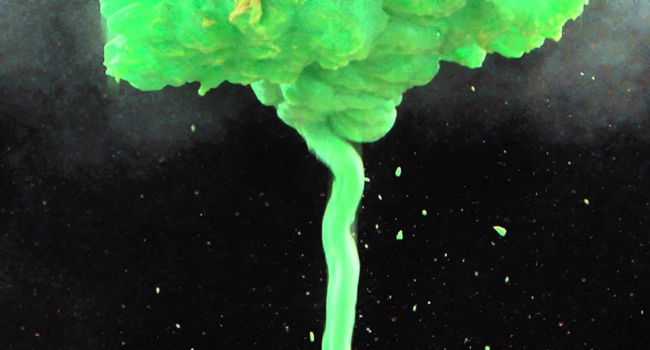It’s fun to hear songwriters wear their hearts on their sleeves, but it can be more interesting when they lace their meaning with cunning misdirection. It gives the listener control to create their own story, but it often leaves room from gross misinterpretation. Here are eight examples where ambiguity—or poppy hooks—sent listeners down a completely different path.
Alkaline Trio – “My Little Needle”
In its infancy, Alkaline Trio was known as much for its members’ love of substances as its music. Vocalists Matt Skiba and Dan Andriano made numerous references to drinking and drugs, so it was no surprise to find a song called “My Little Needle” on the band’s debut Goddamnit. Opening with, “I’ll come down and get you high,” it seems obvious the song is about a literal needle, and descriptions of withdrawal make an ever stronger case. It wasn’t until 2008 when the album was rereleased that a bonus documentary cleared the air. The song’s chorus, “So where are you, my little needle/ The stacks been burned away but I’m so inebriated” finally made sense, it was not about addiction, but finding true love—the “needle in the haystack.”
Cyndi Lauper – “She Bop”
Ok, this one wasn’t as well guised as some of the others, but Lauper did a great job of making the pro-masturbation lyrics secondary to insatiable hook. Lauper wasn’t hiding her intent—a line like “They say I better stop or I’ll go blind,” is anything but vague—it was veiled enough to become a hit the world over. Somehow, Lauper’s relatively tame encouragement of self-gratification was dirty enough to become one of the songs sited when the PMRC wanted to put warning labels on albums. Oh, how times have changed.
Minor Threat – “Guilty of Being White”
Ian MacKaye’s music—as well as his work for various charities and his fierce DIY ethic—is something many still find inspiring. However, “Guilty of Being White” from Minor Threat’s 1981 In My Eyes 7-inch had many labeling MacKaye a racist. The song was written about MacKaye’s experiences of being bullied while at Woodrow Wilson High School—a school with a 70 percent African-American population at the time. The song is equal parts apology for the crimes of MacKaye’s ancestors, and frustration with being grouped in with them. The line between where MacKaye’s anger is placed often goes back and forth, leaving “Guilty of Being White” in an awkward state all its own.
The Vapors – “Turning Japanese”
Much like Lauper’s “She Bop,” The Vapors’ “Turning Japanese” was a song dealing with masturbation. Looking at the song’s lyrics, it’s pretty clear why it would be seen as such. Vocalist David Fenton’s words wring with obsession and alienation, “No sex, no drugs, no wine, no women/No fun, no sin, no you, no wonder it’s dark/Everyone around me is a total stranger,” land him at the conclusion of “That’s why I’m turning Japanese.” While it all seemed rather obvious, Fenton has claimed the song is about youthful angst leading people into situations they didn’t expect. It’s an interesting claim, but when Fenton sings “I want to look at you from inside as well,” it doesn’t lend any credence to his case.
Ozzy Osbourne – “Suicide Solution”
Six years after the release of Ozzy’s massively successful Blizzard of Ozz, Osbourne found himself on trial due to a fan committing suicide while listening to the track. Osbourne defended the song in court, saying it was using the word “solution” not as a means of solving a problem, but as something that dissolves into a liquid. While Ozzy’s lyrics were fairly direct, “Wine is fine/But whiskey’s quicker/Suicide is slow with liquor/Take a bottle, drown your sorrows,” the controversy took place during the height of PMRC’s crusade against “offensive” music. Ozzy was eventually cleared in court, but the song’s legacy still looms.
Slayer – “Angel of Death”
Slayer is no stranger to controversy. The Rick Rubin produced Reign in Blood was an instant thrash masterpiece, but the album’s first track claimed Slayer of Nazi sympathizing and racism. “Angel of Death” tells the story of Nazi surgeon and torturer Josef Mengele. Guitarist Jeff Hanneman wrote the song after reading books on Mengele. It featured lyrics describing Mengele’s despicable work, but it was the fact that the song never chastises Mengele that brought on these claims. Slayer maintained it was not advocating Mengele, merely displaying his beliefs and acts in order to create a fiendish character. Twenty-five years later, Slayer still gets labeled as Nazi sympathizers because of “Angel of Death.”
Third Eye Blind – “Semi-Charmed Life”
Perhaps the catchiest song ever written about crystal meth and getting blowjobs, Third Eye Blind’s “Semi-Charmed Life” became a hit because of a heavily edited radio version. The sexual references stayed, “She comes ‘round and she goes down on me,” but gone were the drug laced lines, “The sky was gold, it was rose/I was taking sips of it through my nose,” and “Doing crystal meth will lift you up until you break.” Perhaps it was Stephan Jenkins’ affable tone mixed with the “do-do-do”’s that made “Semi-Charmed Life” a hit despite its censorship. The song is still as intoxicating, and its lyrics still purposefully gritty.
Bruce Springsteen – “Born in the U.S.A.”
Springsteen’s “Born in the U.S.A.” attempted to display the alienation and displacement of Vietnam veterans returning home with nothing to show for their time at war, “I’m 10 years burning down the road/Nowhere to run, ain’t got nowhere to go.” Due in part to the song’s arena rock leanings, then-president Ronald Reagan attempted to use the song in his reelection campaign in 1984, never mind the fact that Springsteen was a liberal and unsupportive of Reagan’s presidency. It was not until the release of the Tracks collection that the original demo version of “Born in the U.S.A.” surfaced. It was a stripped down acoustic number, encapsulating haunting disenchantment that the album version hid.



